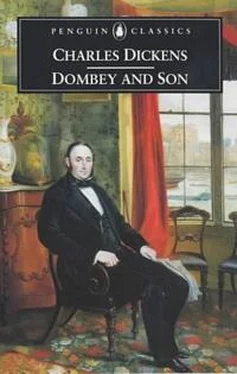'And so do I!' says the Captain.
'So do I,' says Sol Gills.
'Then,' resumes Mr Toots, after some contemplative pulling at his pipe, during which his visage has expressed the most contented reflection, 'what an observant woman my wife is! What sagacity she possesses! What remarks she makes! It was only last night, when we were sitting in the enjoyment of connubial bliss — which, upon my word and honour, is a feeble term to express my feelings in the society of my wife — that she said how remarkable it was to consider the present position of our friend Walters. "Here," observes my wife, "he is, released from sea-going, after that first long voyage with his young bride" — as you know he was, Mr Sols.'
'Quite true,' says the old Instrument-maker, rubbing his hands.
"'Here he is," says my wife, "released from that, immediately; appointed by the same establishment to a post of great trust and confidence at home; showing himself again worthy; mounting up the ladder with the greatest expedition; beloved by everybody; assisted by his uncle at the very best possible time of his fortunes" — which I think is the case, Mr Sols? My wife is always correct.'
'Why yes, yes — some of our lost ships, freighted with gold, have come home, truly,' returns old Sol, laughing. 'Small craft, Mr Toots, but serviceable to my boy!'
'Exactly so,' says Mr Toots. 'You'll never find my wife wrong.
"Here he is," says that most remarkable woman, "so situated, — and what follows? What follows?" observed Mrs Toots. Now pray remark, Captain Gills, and Mr Sols, the depth of my wife's penetration. "Why that, under the very eye of Mr Dombey, there is a foundation going on, upon which a — an Edifice;" that was Mrs Toots's word,' says Mr Toots exultingly, "'is gradually rising, perhaps to equal, perhaps excel, that of which he was once the head, and the small beginnings of which (a common fault, but a bad one, Mrs Toots said) escaped his memory.
Thus," said my wife, "from his daughter, after all, another Dombey and Son will ascend" — no "rise;" that was Mrs Toots's word — "triumphant!"'
Mr Toots, with the assistance of his pipe — which he is extremely glad to devote to oratorical purposes, as its proper use affects him with a very uncomfortable sensation — does such grand justice to this prophetic sentence of his wife's, that the Captain, throwing away his glazed hat in a state of the greatest excitement, cries: 'Sol Gills, you man of science and my ould pardner, what did I tell Wal'r to overhaul on that there night when he first took to business?
Was it this here quotation, "Turn again Whittington, Lord Mayor of London, and when you are old you will never depart from it". Was it them words, Sol Gills?'
'It certainly was, Ned,' replied the old Instrument-maker. 'I remember well.'
'Then I tell you what,' says the Captain, leaning back in his chair, and composing his chest for a prodigious roar. 'I'll give you Lovely Peg right through; and stand by, both on you, for the chorus!'
Buried wine grows older, as the old Madeira did, in its time; and dust and cobwebs thicken on the bottles.
Autumn days are shining, and on the sea-beach there are often a young lady, and a white-haired gentleman. With them, or near them, are two children: boy and girl. And an old dog is generally in their company.
The white-haired gentleman walks with the little boy, talks with him, helps him in his play, attends upon him, watches him as if he were the object of his life. If he be thoughtful, the white-haired gentleman is thoughtful too; and sometimes when the child is sitting by his side, and looks up in his face, asking him questions, he takes the tiny hand in his, and holding it, forgets to answer. Then the child says: 'What, grandpa! Am I so like my poor little Uncle again?'
'Yes, Paul. But he was weak, and you are very strong.'
'Oh yes, I am very strong.'
'And he lay on a little bed beside the sea, and you can run about.'
And so they range away again, busily, for the white-haired gentleman likes best to see the child free and stirring; and as they go about together, the story of the bond between them goes about, and follows them.
But no one, except Florence, knows the measure of the white-haired gentleman's affection for the girl. That story never goes about. The child herself almost wonders at a certain secrecy he keeps in it. He hoards her in his heart. He cannot bear to see a cloud upon her face.
He cannot bear to see her sit apart. He fancies that she feels a slight, when there is none. He steals away to look at her, in her sleep. It pleases him to have her come, and wake him in the morning.
He is fondest of her and most loving to her, when there is no creature by. The child says then, sometimes: 'Dear grandpapa, why do you cry when you kiss me?'
He only answers, 'Little Florence! little Florence!' and smooths away the curls that shade her earnest eyes.
The voices in the waves speak low to him of Florence, day and night — plainest when he, his blooming daughter, and her husband, beside them in the evening, or sit at an open window, listening to their roar. They speak to him of Florence and his altered heart; of Florence and their ceaseless murmuring to her of the love, eternal and illimitable, extending still, beyond the sea, beyond the sky, to the invisible country far away.
Never from the mighty sea may voices rise too late, to come between us and the unseen region on the other shore! Better, far better, that they whispered of that region in our childish ears, and the swift river hurried us away!
I cannot forego my usual opportunity of saying farewell to my readers in this greetingplace, though I have only to acknowledge the unbounded warmth and earnestness of their sympathy in every stage of the journey we have just concluded.
If any of them have felt a sorrow in one of the principal incidents on which this fiction turns, I hope it may be a sorrow of that sort which endears the sharers in it, one to another. This is not unselfish in me. I may claim to have felt it, at least as much as anybody else; and I would fain be remembered kindly for my part in the experience.
DEVONSHIRE TERRACE,
Twenty-Fourth March, 1848.
I make so bold as to believe that the faculty (or the habit) of correctly observing the characters of men, is a rare one. I have not even found, within my experience, that the faculty (or the habit) of correctly observing so much as the faces of men, is a general one by any means. The two commonest mistakes in judgement that I suppose to arise from the former default, are, the confounding of shyness with arrogance — a very common mistake indeed — and the not understanding that an obstinate nature exists in a perpetual struggle with itself.
Mr Dombey undergoes no violent change, either in this book, or in real life. A sense of his injustice is within him, all along. The more he represses it, the more unjust he necessarily is. Internal shame and external circumstances may bring the contest to a close in a week, or a day; but, it has been a contest for years, and is only fought out after a long balance of victory.
I began this book by the Lake of Geneva, and went on with it for some months in France, before pursuing it in England. The association between the writing and the place of writing is so curiously strong in my mind, that at this day, although I know, in my fancy, every stair in the little midshipman's house, and could swear to every pew in the church in which Florence was married, or to every young gentleman's bedstead in Doctor Blimber's establishment, I yet confusedly imagine Captain Cuttle as secluding himself from Mrs MacStinger among the mountains of Switzerland.
Читать дальше











